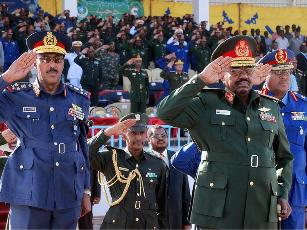Sudan to increase military budget next year – parliament
November 5, 2012 (KHARTOUM) – The Sudanese parliament revealed on Sunday that the country’s military budget will be increased next year to strengthen the army’s defense capabilities as criticism grows over the failure to respond to an Israeli airstrike that allegedly destroyed an arms factory in the capital Khartoum last month.
 The parliament’s deputy speaker, Hajo Gasim Al-Sid, who made the announcement threatened that Sudan will pay Israel back “if not today then tomorrow”. The official was referring to the alleged Israeli air attack on a military factory in the southern suburbs of Khartoum.
The parliament’s deputy speaker, Hajo Gasim Al-Sid, who made the announcement threatened that Sudan will pay Israel back “if not today then tomorrow”. The official was referring to the alleged Israeli air attack on a military factory in the southern suburbs of Khartoum.
Khartoum says four Israeli jet fighters used high technology to jam its radars before striking the factory and left the country without any interference from Sudan’s air defense forces.
Sudan already spends a big chunk of its budget on defense. According to latest figures by Research and Markets, a think-tank, the Sudanese defense expenditure stood at US$3.308bn in 2010 and is expected to rise to US$3.923bn in 2011, amounting to 22.2% of GDP.
The Sudanese air force consists of 61 combat capable aircraft, as well as Russian-built Divina 2 anti-aircraft missiles, according to the 2012 edition of the International Institute for Strategic Studies’ The Military Balance”.
The parliamentarian described Sudan’s complaint to the UN Security Council (UNSC) against Israel as “futile”, accusing the world organization of neglecting Sudanese complaints. He also called for compensating those affected by the alleged airstrike and relocating military factories outside of the capital.
The information minister Ahmed Bilal Osman said last week that the president Omer Al-Bashir had given the instruction to relocate the ammunition factory outside the capital.
Meanwhile, Sudan defense minister Abdel Rahim Mohamed Hussein officially asked to cancel his scheduled appearance before the parliament today, 5 November, citing commitments to attend meetings of the joint security committee with neighbouring South Sudan in the latter’s capital Juba.
Hussein has been keeping a low profile and has made no public comment to date about the alleged Israeli airstrike, which gave rise to calls for his resignation on account of his failure to protect the country.
The opposition Popular Congress Party (PCP) led by Hassan Al-Turabi renewed criticism against the government on Saturday, holding it responsible for what it termed as the violation of the sanctity of Sudanese territories.
PCP’s political secretary Kamal Omar said that the regime’s suspicious relations are what led Israel to attack the factory, in reference to rumors that Al-Yarmouk is linked to military cooperation between Sudan and Iran.
Omer derided what he described as the fact that the government was using its military capabilities in pulverizing its opponents in Darfur, South Kordofan and Blue Nile while four Israeli jet fighters violated Sudanese airspace, bombed a military facility and flew back home unharmed.
The opposition official called on the government “to go” after it embarrassed the country and ran national sovereignty to the ground. He added that this regime can no longer be trusted to protect Sudan and called for the resignation of defense minister.
Similarly, a prominent cleric, Imam Kamal Riziq of Khartoum Grand Mosque, launched a scathing attack against the government during his sermon on Friday, saying that it holds direct responsibility for repeated Israeli attacks.
Riziq also called for sacking the defence minister and holding him accountable because he bears the main responsibility for failing to prevent this attack.
(ST)
